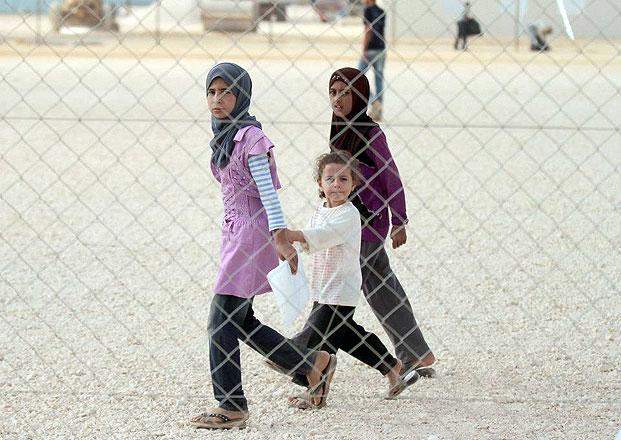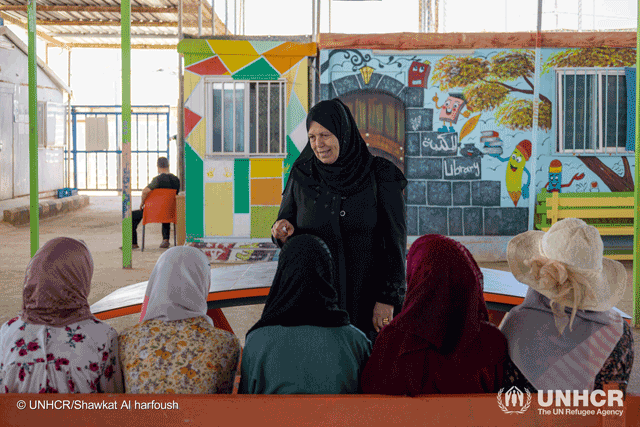You are here
Zaatari camp children targeted by sexual education after alarming behaviours noticed
By Mohammad Ghazal - Apr 05,2016 - Last updated at Apr 05,2016
AMMAN — It started when 11-years-old Syrian boy, Samer, saw his parents one day having intercourse at midnight. Then, he started to pretend to be asleep at night just to watch them and try next day to imitate the act with the girls next door in Zaatari Refugee Camp.
Samer, who lives with his four siblings and parents in a small mobile house in the camp, was caught along with a group of boys and girls in the camp while getting naked, kissing and grabbing each other.
Samer, not his real name, is one of several children at the Zaatari Refugee camp who were targetted in several awareness activities to curb rising sexual behaviours among Syrian children in the makeshift town, which is home to some 80,000 refugees.
“We knew about Samer when a Syrian woman complained that she saw him getting her 13-years-old daughter undressed in a tent where many kids gathered and were kissing each other,” a case protection manager working for an international agency that deals with such cases told The Jordan Times on Tuesday on condition of anonymity.
“We asked Samer why he did that and he said he was basically doing like his parents at night as he slept on the mattress next to them,” she said.
“He said he was gathering almost every day with girls and boys in a tent, and telling the boys and girls what he saw and heard,” she said.
“The problem of sexual behaviours among Syrian children is on the rise in the camp and many agencies are engaged in activities to raise awareness among parents and kids on this issue,” the social worker said.
“Most of the time, kids are left alone to play in tents, do not go to school regularly, their parents are busy working or simply not looking after them,” she said.
After some denial, Samer’s mother was convinced that there was a problem. She said: “I never realised that he was watching us at night. He watches Turkish and Indian drama that are all about love stories, and where actors and actresses kiss all the time, but I never felt that he would be affected in this way.”
At the workshop, Samer and several other kids were given lessons on their body parts and which parts “other should not see or touch”, Salma, a psychological therapist who was part of the workshop, told The Jordan Times on Tuesday.
“We teach them about how sensitive it is to exercise such sexual behaviours… We are also engaged in efforts to raise awareness among parents who need to be careful and watch over their children,” Salma said.
Manal, the mother of the girl involved with Samer, told The Jordan Times: “I saw that boy kissing my daughter and undressing her. I complained to his mother, but she first did not believe me. I threatened her to complain to police. Finally she apologised to me and promised to keep an eye on him”.
“The problem is that I sometimes leave to work outside the camp and I do not have the time to watch my three kids all the time. I told my daughter not to play with the kids anymore,” Manal said over the phone recently.
Hussein Khuzai, a professor of sociology at Al Balqa Applied University, said the issue of sexual behaviours among children in the camp is real challenge.
“Parents need to be careful, especially in the camps where all family members live in one small mobile house most of the time,” Khuzai told The Jordan Times Tuesday.
“These behaviours are very serious. They may lead to criminal activities in future. Living conditions generally in the camp do not help in monitoring the children all the time. Therefore, raising awareness on the issue among kids and their parents is the key to curbing such acts,” said Khuzai.
Related Articles
AMMAN — TikTok might pose “serious threats to the long-term mental health and emotional well-being of its young users”, experts suggest.&nbs
AMMAN — Salma, a 13-year-old Syrian refugee, was playing with friends outside her tent when her step-mother asked her to come inside and tol
AMMAN — In Zaatari refugee camp, two Syrian women, Shokreh Al Masalmeh and Ghada Al Qablawiare, have emerged as vigorous advocates against c


















